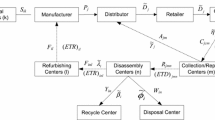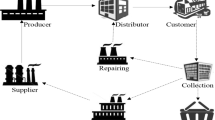Abstract
In this paper a supply chain network for producing and distributing the dairy products of a case study is designed. A supply chain with suppliers, potential plants, potential distribution centers, customers, potential collection/recycling centers, potential disposal centers, and multi-mode transportation under cost, environmental-, and social-based objective functions is formulated mathematically. In the proposed formulation, according to the uncertain nature of the problem in real-world situations, some of the parameters are considered as intuitionistic fuzzy values. In addition to the required location and allocation decisions, two main difficulties of the proposed problem are its uncertain nature and its multi-objectivity. To overcome such difficulties, a method considering the acceptance degree of fuzzy constraints violated is used to convert the fuzzy formulation to its equivalent crisp form. As a novelty, this method for the first time is modified for intuitionistic fuzzy values. Then the obtained multi-objective crisp formulation is solved by five multi-objective optimization approaches of the literature. At the end the data of the case study from Iran are used to evaluate the proposed crisp formulation and comparison of the multi-objective solution approaches.












Similar content being viewed by others
Explore related subjects
Discover the latest articles, news and stories from top researchers in related subjects.References
Alavidoost MH, Babazadeh H, Sayyari ST (2016) An interactive fuzzy programming approach for bi-objective straight and U-shaped assembly line balancing problem. Appl Soft Comput 40:221–235
Aliya F, Fazli A, Hussain SSB (2020) Geometric operators based on linguistic interval-valued intuitionistic neutrosophic fuzzy number and their application in decision making. Ann Optim Theory Pract 3(1):47–71
Amin SH, Zhang G, Akhtar P (2017) Effects of uncertainty on a tire closed-loop supply chain network. Expert Syst Appl 73:82–91
Arampantzi C, Minis I (2017) A new model for designing sustainable supply chain networks and its application to a global manufacturer. J Clean Prod 156:276–292
Ardalan Z, Karimi S, Naderi B, Arshadi Khamseh A (2016) Supply chain networks design with multi-mode demand satisfaction policy. Comput Ind Eng 96:108–117
Atanassov KT (1986) Intuitionistic fuzzy sets. Fuzzy Sets Syst 20:87–96
Battini D, Bogataj M, Choudhary A (2017) Closed loop supply chain (CLSC): economics, modelling, management and control. Elsevier, Amsterdam
Brandenburg M, Govindan K, Sarkis J, Seuring S (2014) Quantitative models for sustainable supply chain management: developments and directions. Eur J Oper Res 233:299–312
Dai Z, Zheng X (2015) Design of close-loop supply chain network under uncertainty using hybrid genetic algorithm: a fuzzy and chance-constrained programming model. Comput Ind Eng 88:444–457
Dehghan E, Shafiei Nikabadi M, Amiri M, Jabbarzadeh A (2018) Hybrid robust, stochastic and possibilistic programming for closed-loop supply chain network design. Comput Ind Eng 123:220–231
Devika K, Jafarian A, Nourbakhsh V (2014) Designing a sustainable closed-loop supply chain network based on triple bottom line approach: a comparison of metaheuristics hybridization techniques. Eur J Oper Res 235:594–615
Diabat A, Jebali A (2021) Multi-product and multi-period closed loop supply chain network design under take-back legislation. Int J Prod Econ 231:107879
Gaur J, Amini M, Rao AK (2017) Closed-loop supply chain configuration for new and reconditioned products: an integrated optimization model. Omega 66:212–223
Govindan K, Nicoleta Popiuc M, Diabat A (2013) Overview of coordination contracts within forward and reverse supply chains. J Clean Prod 47:319–334
Kannegiesser M, Günther HO, Autenrieb N (2015) The time-to-sustainability optimization strategy for sustainable supply network design. J Clean Prod 108:451–463
Kaya O, Bagci F, Turkay M (2014) Planning of capacity, production and inventory decisions in a generic reverse supply chain under uncertain demand and returns. Int J Prod Res 52(1):270–282
Keyvanshokooh E, Ryan SM, Kabir E (2015) Hybrid robust and stochastic optimization for closed-loop supply chain network design using accelerated Benders decomposition. Eur J Oper Res 249(1):76–92
Li DF, Nan JX, Zhang MJ (2012) Interval programming models for matrix games with interval payoffs. Optim Methods Softw 27(1):1–16
Listes O, Dekke R (2005) A stochastic approach to a case study for product recovery network design. Eur J Oper Res 160:268–287
Mahmoodirad A, Sanei M (2016) Solving a multi-stage multi-product solid supply chain network design problem by meta-heuristics. Sci Iran 23(3):1429–1440
Mahmoodirad A, Allahviranloo T, Niroomand S (2019) A new effective solution method for fully intuitionistic fuzzy transportation problem. Soft Comput 23(12):4521–4530
Mahmoodirad A, Niroomand S, Shafiee M (2020) A closed loop supply chain network design problem with multi-mode demand satisfaction in fuzzy environment. J Intell Fuzzy Syst 39(1):503–524
Mishmast Nehi H, Maleki HR (2005) Intuitionistic fuzzy numbers and its applications in fuzzy optimization problem. In: Proceedings of the 9th WSEAS international conference on systems, Athens, Greece
Mosallaeipour S, Mahmoodirad A, Niroomand S, Vizvari B (2018) Simultaneous selection of material and supplier under uncertainty in carton box industries: a fuzzy possibilistic multicriteria approach. Soft Comput 22(9):2891–2905
Mosallanezhad B, Hajiaghaei-Keshteli M, Triki C (2021) Shrimp closed-loop supply chain network design. Soft Comput 25(11):7399–7422
Mota B, Isabel Gomes M, Carvalho A, Paula Barbosa-Povoa A (2014) Towards supply chain sustainability: economic, environmental and social design and planning. J Clean Prod 1–14
Niroomand S (2018) A multi-objective based direct solution approach for linear programming with intuitionistic fuzzy parameters. J Intell Fuzzy Syst 35(2):1923–1934
Niroomand S, Mahmoodirad A, Mosallaeipour S (2019) A hybrid solution approach for fuzzy multiobjective dual supplier and material selection problem of carton box production systems. Expert Syst 36(1):e12341
Niroomand S, Garg H, Mahmoodirad A (2020) An intuitionistic fuzzy two stage supply chain network design problem with multi-mode demand and multi-mode transportation. ISA Trans 107:117–133
Özceylan E, Paksoy T (2013a) A mixed integer programming model for a closed-loop supply-chain network. Int J Prod Res 51(3):718–734
Özceylan E, Paksoy T (2013b) Fuzzy multi-objective linear programming approach for optimising a closed-loop supply chain network. Int J Prod Res 51(8):2443–2461
Özkır V, Baslıgil H (2013) Multi-objective optimization of closed-loop supply chains in uncertain environment. J Clean Prod 41:114–125
Pishvaee MS, Razmi J (2012) Environmental supply chain network design using multi-objective fuzzy mathematical programming. Appl Math Model 36(8):3433–3446
Pishvaee MS, Torabi SA, Razmi J (2012) Credibility-based fuzzy mathematical programming model for green logistics design under uncertainty. Comput Ind Eng 62:624–632
Pishvaee MS, Razmi J, Torabi SA (2014) An accelerated Benders decomposition algorithm for sustainable supply chain network design under uncertainty: a case study of medical needle and syringe supply chain. Transp Res Part E 67:14–38
Pourjavad E, Mayorga RV (2019) Multi-objective fuzzy programming of closed-loop supply chain considering sustainable measures. Int J Fuzzy Syst 21(2):655–673
Rafie-Majd Z, Pasandideh SHR, Naderi B (2018) Modelling and solving the integrated inventory-location-routing problem in a multi-period and multi-perishable product supply chain with uncertainty: lagrangian relaxation algorithm. Comput Chem Eng 109:9–22
Rahimi M, Ghezavatian V, Asadi F (2019) A stochastic risk-averse sustainable supply chain network design problem with quantity discount considering multiple sources of uncertainty. Comput Ind Eng 130(2019):430–449
Sahebjamnia N, Fathollahi-Fard AM, Hajiaghaei-Keshteli M (2018) Sustainable tire closed-loop supply chain network design: hybrid metaheuristic algorithms for large-scale networks. J Clean Prod 196:273–296
Sanei M, Mahmoodirad A, Niroomand S, Jamalian A, Gelareh S (2017) Step fixed charge solid transportation problem: a Lagrangian relaxation heuristic approach. Comput Appl Math 36(3):1217–1237
Selim H, Ozkarahan I (2008) A supply chain distribution networkdesign model: an interactive fuzzy goal programming-based solution approach. Int J Adv Manuf Technol 36:401–418
Sgarbossa F, Russo I (2017) A proactive model in sustainable food supply chain: insight from a case study. Int J Prod Econ 183:596–606
Soleimani H (2018) A new sustainable closed-loop supply chain model for mining industry considering fixed-charged transportation: a case study in a travertine quarry. Resour Policy. https://doi.org/10.1016/j.resourpol.2018.07.006
Soleimani H, Govindan K, Saghafi H, Jafari H (2017) Fuzzy multi-objective sustainable and green closed-loop supply chain network design. Comput Ind Eng 109:191–203
Tahirov N, Hasanov P, Jaber MY (2016) Optimization of closed-loop supply chain of multi-items with returned subassemblies. Int J Prod Econ 174:1–10
Taleizadeh A, Haghighi F, Akhavan Niaki ST (2019) Modeling and solving a sustainable closed loop supply chain problem with pricing decisions and discounts on returned products. J Clean Prod 207:163–181
Torabi SA, Hassini E (2008) An interactive possibilistic programming approach for multiple objective supply chain master planning. Fuzzy Sets Syst 159:193–214
Tsao YC, Thanh VV, Lu JC, Yu V (2018) Designing sustainable supply chain networks under uncertain environments: fuzzy multi-objective programming. J Clean Prod 174:1550–1565
Ullah K, Mahmood T, Jan N, Ahmad Z (2020) Policy decision making based on some averaging aggregation operators of t-spherical fuzzy sets; a multi-attribute decision making approach. Ann Optim Theory Pract 3(3):69–92
Vizvári B, Guden H, Nejad G (2018) Local search based meta-heuristic algorithms for optimizing the cyclic flexible manufacturing cell problem. Ann Optim Theory Pract 1(3):15–32
Wanke P, Azad MAK, Barros CP, Hassan DMK (2016) Predicting efficiency in islamic banks: an integrated multicriteria decision making (MCDM) approach. J Int Financ Mark Inst Money 45:126–141
Wanke P, Alvarenga H, Correa H, Hadi-Vencheh A, Azad MAK (2017) Fuzzy inference systems and inventory allocation decisions: exploring the impact of priority rules on total costs and service levels. Expert Syst Appl 85:182–193
Zhalechian M, Tavakkoli-Moghaddam R, Zahiri B, Mohammadi M (2016) Sustainable design of a closed-loop location-routing-inventory supply chain network under mixed uncertainty. Transp Res Part E Logist Transp Rev 89:182–214
Zimmermann HJ (1978) Fuzzy programming and linear programming with several objective functions. Fuzzy Sets Syst 1:45–55
Author information
Authors and Affiliations
Corresponding author
Ethics declarations
Conflict of interest
We have no conflict of interest.
Human or animal rights
This article does not contain any studies with human participants or animals performed by any of the authors.
Informed consent
Informed consent was obtained from all individual participants included in the study.
Additional information
Publisher's Note
Springer Nature remains neutral with regard to jurisdictional claims in published maps and institutional affiliations.
Rights and permissions
About this article
Cite this article
Behzadianfar, M., Eydi, A. & Shahrokhi, M. A sustainable closed loop supply chain design problem in intuitionistic fuzzy environment for dairy products. Soft Comput 26, 1417–1435 (2022). https://doi.org/10.1007/s00500-021-06409-6
Accepted:
Published:
Issue Date:
DOI: https://doi.org/10.1007/s00500-021-06409-6




